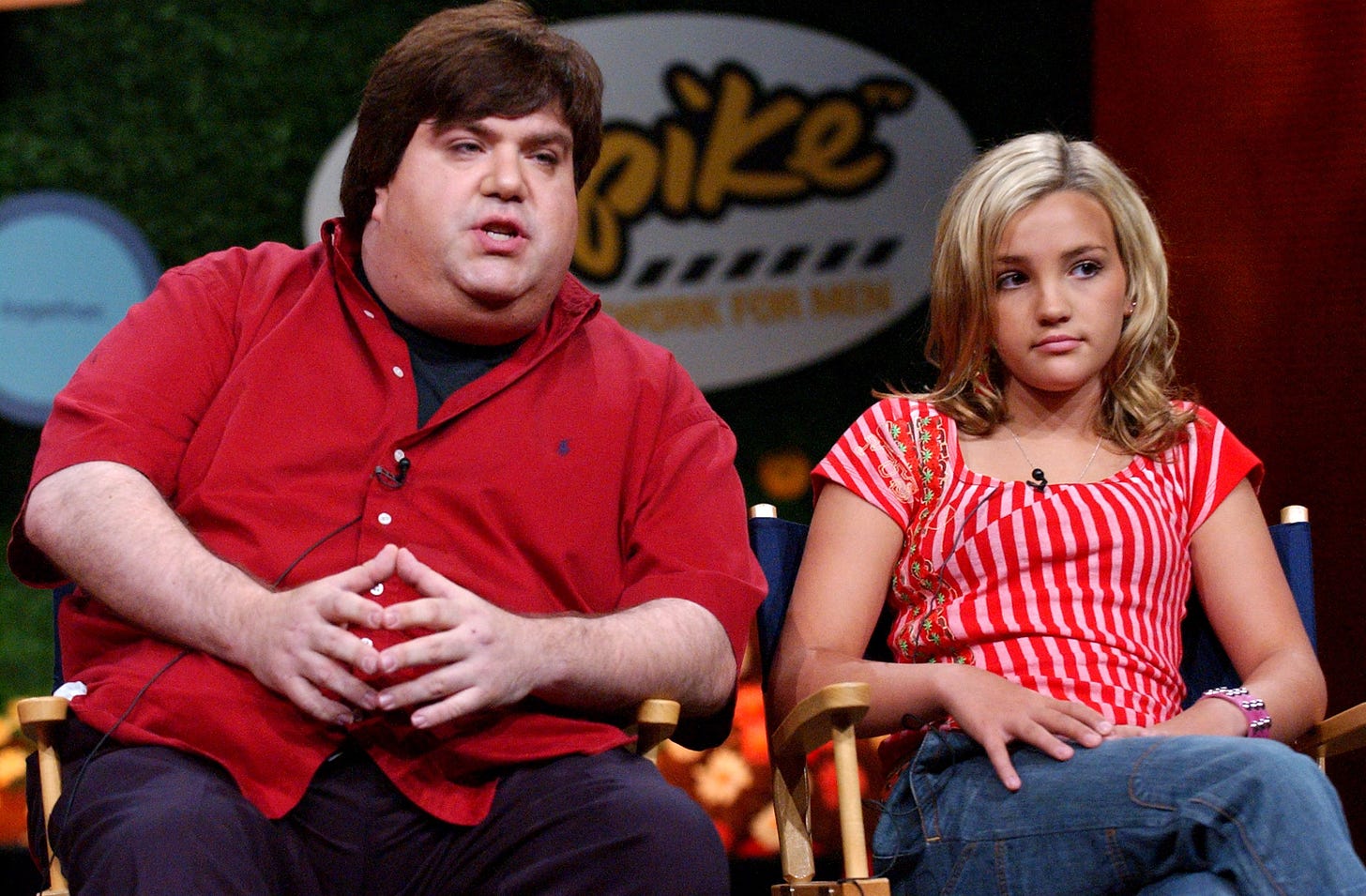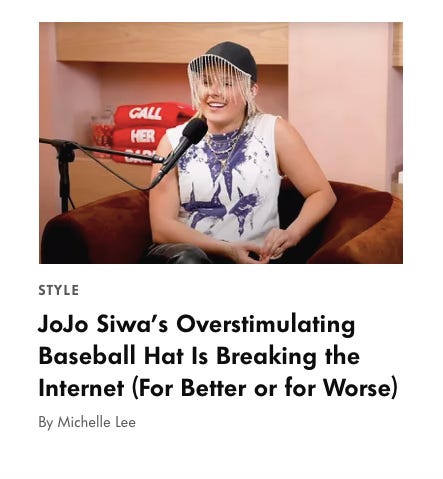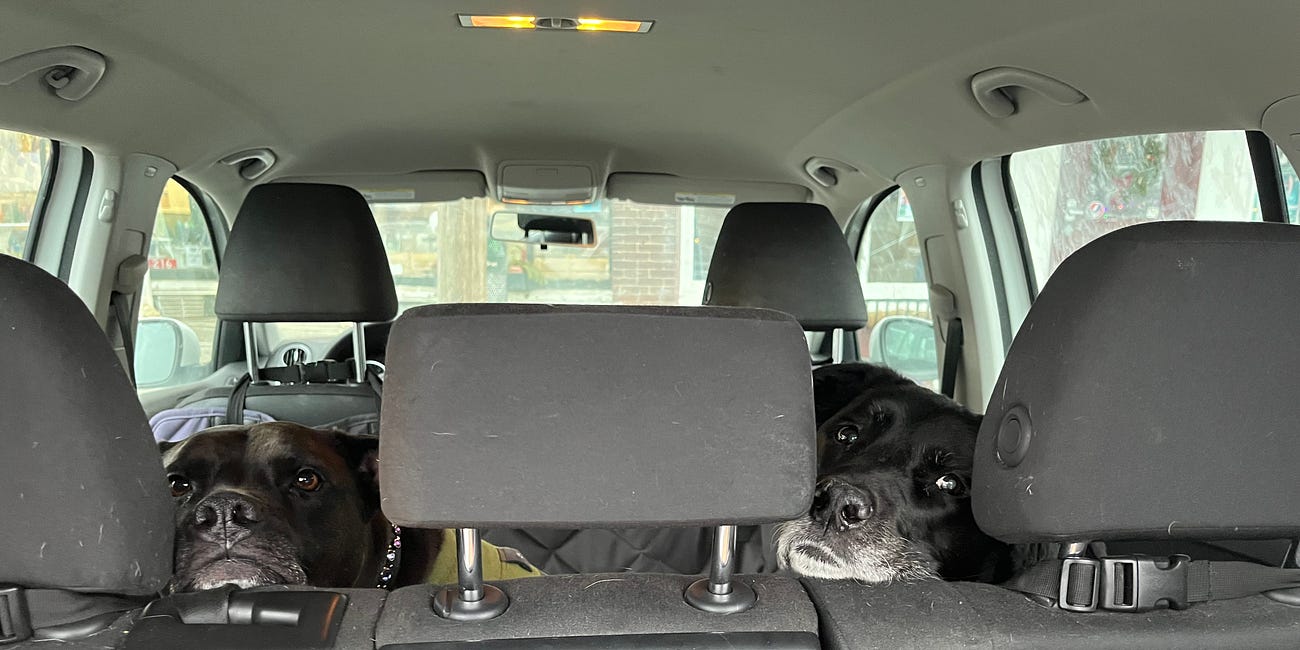I’m not usually into true crime, but lately I’ve been motoring through documentary series about cults. I watched Shiny Happy People: Duggar Family Secrets (yikes), Stolen Youth: Inside the Cult at Sarah Lawrence (double yikes), and Love Has Won: The Cult of Mother God (yiiiikes^∞). I started and abandoned Brandy Hellville: The Cult of Fast Fashion and The Many Lives of Martha Stewart, which are about popular brands and the people behind them, not actual cults. There’s a real clickbait quality to these docs—Martha Stewart, especially, keeps promising scandal and delivering talking heads with various degrees of Martha-connection being like, “Martha Stewart is extremely hardworking, smart, and sometimes a real bitch.“ Like, yes!! Of course she is!!
I watched the first two episodes of Under the Bridge, a murder mystery based on the 1997 murder of Reena Virk, a Canadian teenager who was beaten to death in the most extreme outcome of hierarchy and bullying amongst middle school girls. Riley Keough stars as Rachel, a writer who has real Jenny Schecter at the typewriter energy. Lily Gladstone is hot Cam, a cop with something to prove. There’s sexual tension between Rachel and Cam, and it will be genuinely homophobic if they don’t make out. Also Vritika Gupta, the actress who plays Reena, is so soulful in this series. A lot of the press for this show emphasizes how Under the Bridge is an attempt at a more responsible, restorative justice-y true crime, and I’m open to seeing what that looks like.
I also made it through the first four episodes and part of the fifth episode of Quiet on Set: The Dark Side of Kids TV—a docuseries about Nickelodeon’s treatment of child actors in the 90s and 00s, specifically kids who worked with Dan Schneider, the writer and producer behind All That, The Amanda Show, iCarly, and a spate of other IPs that were formative to millennials and Gen Z alike (not me, though. My family didn’t have cable.) This documentary felt so unsatisfying and sensationalized, like it’s stuck in that feeling when someone tells you something horrible and your first instinct is to laugh.
🛑 Quiet on Set and the rest of this post deal heavily with child sexual abuse and child abuse more generally. If that sounds like something that’s not for you, stop reading now. 🙅♀️
Nickelodeon and Dan Schneider’s mistreatment of child actors has long been the domain of Reddit detectives and internet sleuths. I first learned about it in Jennette McCurdy’s memoir, I’m Glad My Mom Died. I’ve recommended this book before, I think it might be the only good celebrity memoir ever written. Jennette was sexually and psychologically abused by her mother from earliest age, and this abuse primed Jennette to succeed at Dan Schneider’s Nickelodeon. Jennette writes that when she finally left Nickelodean, the network offered her $300k to sign a NDA to never, ever talk about her experiences with Dan Schneider. She declined and states that in addition to playing mind games with vulnerable teenage cast members, he frequently offered her and her underage co-stars alcohol and massages.
Dan Schneider’s TV shows were performed by children, ostensibly for an audience of children, and viewers have long pointed out that they are filled with varying degrees of sexual innuendo and visuals that seem to reference porn. There’s one particular gag where a teenaged Ariana Grande, arguably the most famous Nickelodeon alum, gives a simulated hand-job to a potato; and another where goo splatters on Jaime Lynn Spear’s face in a barely-coded cum shot. We also see Dan in a hot tub with teenage Amanda Bynes, a glory hole for pickles, and countless close-up shots of naked feet. The documentary zooms in and plays this footage over and over, effectively making it pornier and, to my eye, perpetuating the exploitation it purports to condemn. The fact that Ariana Grande, Jaime Lynn Spears, Amanda Bynes, and Jennette McCurdy are absent from the doc’s roster of interviewees adds an extra layer of grossness, like we’re rehashing their trauma and humiliation for no other reason than entertainment.
The culmination of Quiet on Set is an interview with Drake Bell, a former Nickelodeon star who was groomed and repeatedly raped by a dialogue coach during his time at the network. The documentary only briefly acknowledges that years later, Drake himself was convicted of inappropriate contact with a minor after a former fan came forward with evidence that he had sent her suggestive text messages while she was still a teenager. There are levels of harm, and photos and text messages are not the same as rape, sure, but this omission is a tidy example of the way that the documentary resists larger questions about violence and how abuse is perpetrated—even when those questions are right there, begging to be discussed. The fifth episode, which is supposed to offer solutions for the prevalence of child abuse in Hollywood, drives this home even further, in that it seems primarily interested in which C and D-list celebrities have apologized to Drake for writing letters of support for the dialogue coach when he was facing criminal charges for abusing Drake. (Not discussed: maybe no one wants to come out in support of Drake because he, too, is a creep? I'm not sure I would say the documentary gives Drake a pass on his bad behavior, but there’s an obvious transactionality to his appearance in the doc — like he was willing to participate in hopes to get his reputation rehabilitated, which means he probably put conditions on how much the series was able to talk about the various accusations against him.)
Speaking of omissions, I wish this documentary had incorporated interviews with a psychologist or trauma therapist to discuss how abuse is perpetuated, why child actors are vulnerable, or simply assert that someone can abuse one person and act really normal, if not wonderful, to others, and the regular person/total monster binary only serves to conceal and enable abuse. It should be shocking that a bunch of celebrities and Hollywood professionals wrote letters in support of a rapist, but tonally, Quiet on Set is trying to be a documentary about child abuse happening in plain sight, and a nostalgia fest for people who grew up in the 90s and 2000s. The result is a fruit roll-up of trauma and “omg remember Shawn from Boy Meets World?” moments that leaves a bad taste.
While we’re on the topic of famous children and the adults they become, I can’t stop thinking about Jojo Siwa’s incredibly stressful, 97-minute Call Her Daddy interview. If you read between the lines of what Jojo is saying on this podcast, even a tiny bit, it’s clear that she’s being financially exploited by her parents, and has no idea because she’s only 20 and this fucked-up family/management system are all she’s ever known. Jojo’s mom is her manager and costume designer, and the quotes Jojo attributes to this woman are pure manipulation (“You would help a homeless person on the street, so why wouldn’t you help your family?” in response to Jojo turning 18 and gaining access to her Coogan Account. Meanwhile, Jojo already splits her income 50/50 with her mom, and makes it clear that she has purchased and renovated multiple homes for her parents and brother — so why does she need to share her Coogan money, too? Something’s hinky.)
At one point, Jojo brags about how, when she was 13 years old, she was writing, performing, and editing 10 YouTube videos a week, and my girlfriend--a public interest lawyer who hates child labor--turned to the Bluetooth speaker and yelled, “You should have been in SCHOOL.“
Jojo was on Call Her Daddy to promote her new single, “Karma.“ This song is bad and the accompanying music video features mermaid imagery, the lyrics “thou shall not lie, thou shall not cheat,“ and dancing that is acrobatic and strangely unsexy for something that’s supposed to announce Jojo’s arrival as an adult who fucks. And Jojo’s new-found “bad girl“ image, which I can only describe as a sparkly lizard suit with panties, is its own bewildering thing. I think “haters make you famous“ has always been part of Jojo’s strategy and she intentionally plays into the internet’s hands by being unfiltered and embarrassing, and otherwise cultivating a meme persona. But it’s also a bummer that she genuinely wants to begin a new era for herself, one where’s she’s seen as an adult in the eyes of the world, but isn’t able to do that with the infrastructure and tools available to her.
Jojo is an interesting counter example to Quiet on Set, because she’s still on the verge of realizing that maybe children shouldn’t have jobs, let alone full-time careers where their physical appearance is constantly evaluated. She states over and over again that she chose to pursue fame, and credits her parents for supporting her in following her dreams. There’s absolutely a budding consciousness here—she’s protesting too much. While it does seem clear that she wasn’t abused in quite the same way that the All That cast was, her singular pursuit of child stardom has cost her valuable things like friends her own age, an education, a sense of perspective, etc. I don’t know. I’m very curious to check in again with Jojo about all this stuff when she’s like, 25.
Topical essays about child stars and what we owe children:
“At Sea with Mary-Kate and Ashley, and 200 Super Fans” by Chloe Schildhause
“So You Think You’ve Been Gaslit: What happens when a niche clinical concept becomes a ubiquitous cultural diagnosis” by Leslie Jamison “…although romantic relationships dominate our cultural narratives of gaslighting, the parent-child dynamic is a far more useful frame.“
“Death and the Maiden: What Rewatching the OC Can Teach Us Now” by Kelly Marie Coyne










I, too, didn't have cable, so I haven't really been into the Nickelodeon documentary. Thank you for writing a summary, though; I'm glad I've been informed. I've been interested in reading I'm Glad My Mom Died, but it seems...stressful.
Growing up, my mom was obsessed with watching TV shows that were true crime before true crime was a genre: Cops, 48 Hours, things like that. (It always seemed like there was one for every night of the week, even on public access channels.) It was very often the last thing I'd watch before going to bed: stories about rape, murder, dismemberment, all packaged by some lurid narrator with bad reenactments. I'm not entirely sure why millennial women seem so obsessed with true crime - I'm sure there's tons of speculation out there - but with my mom, I felt like it was a confirmation of a bias that the world was dangerous, and it was better to just stay home and self-isolate. Either way, I'm glad that she doesn't know that true crime exists as a genre and also doesn't know how podcasts work. May this continue indefinitely.
so many thoughts as i generally avoid most true crime but my particular niche of interest is scams and cults. i didn't watch quiet on set after hearing the reviews and that so many affected weren't involved - pretty sure that production company also did a doc on "the glee curse" about three main actors dying which felt really exploitative. i also have zero nostalgia for nickelodeon as a cable-less child, but jennette's memoir is SO good and certainly one of the best i've read celeb or otherwise. i do consider jessica simpson's memoir to be very high caliber and a similar reflection on the abuse related to her stardom and the alcoholism that came from that.
for anyone unsatisfied with quiet on set, i would really recommend the hbo doc showbiz kids - to me it gave a full picture of the abuse and labor exploitation of child acting without being re-traumatizing, with interviews with people like mara wilson and evan rachel wood and also going back through the history of child actors.